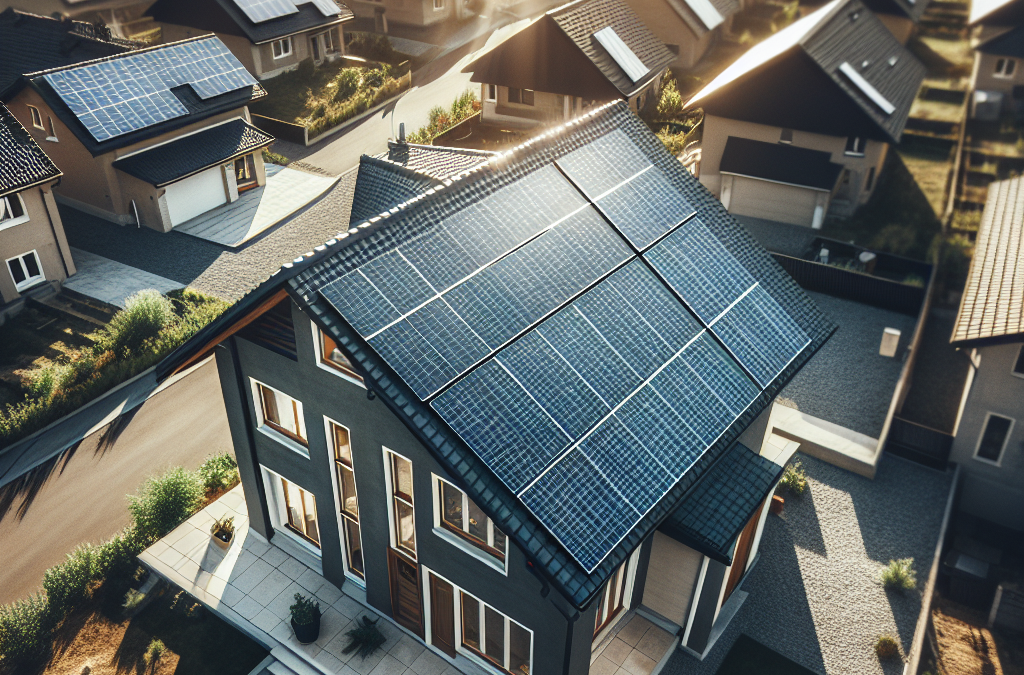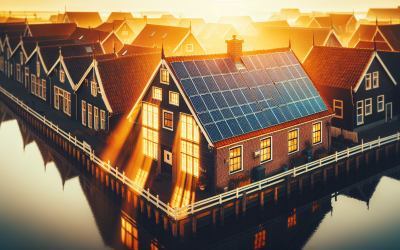Thinking about going solar? One crucial question on your mind might be whether or not you need to replace your roof before installing solar panels. After all, investing in solar energy is a significant decision, and you want to ensure you make the right choices. In this article, we will explore the importance of having a solid roof foundation for installing solar panels, the potential risks of installing on an old or damaged roof, and when it may be necessary to replace your roof before going solar.
Factors to Consider
Age and Condition of the Roof
The age and condition of your roof are crucial factors to consider before installing solar panels. If your roof is old and in poor condition, it may not be structurally sound enough to support the weight of the solar panels. Additionally, a damaged roof can result in leaks and other issues that could compromise the integrity of your solar panel system. It is recommended to have your roof inspected by a professional to determine if any repairs or replacements are necessary before proceeding with the solar panel installation.
Weight Limit of the Roof
Solar panels can add significant weight to your roof, so it is essential to understand the weight limit of your existing roof. Different roofing materials have different weight tolerances, and exceeding these limits can lead to structural problems. Consulting with a roofing professional can help you determine if your roof can support the additional weight of solar panels or if reinforcement is required before installation.
Shading and Sun Exposure
The amount of shade and sun exposure your roof receives is another crucial factor to consider. To maximize the efficiency of your solar panels, they need to be installed in an area with sufficient sunlight. If your roof is heavily shaded by trees or buildings, it may not be an ideal location for solar panel installation. However, if you can address the shading issue, such as by trimming trees or installing solar panel systems on another part of your property, you may still be able to benefit from solar energy.
Benefits of Replacing the Roof
Improved Structural Integrity
Replacing your roof before installing solar panels ensures that the underlying structure is in excellent condition. By reinforcing weak spots and fixing any damage, you create a solid foundation for the solar panel system. A structurally sound roof will be better equipped to handle the weight of the panels and provide long-term stability and protection.
Increased Lifespan of Solar Panels
A new, well-maintained roof can prolong the lifespan of your solar panels. By preventing leaks and other potential damages caused by an aging roof, you can ensure that your solar panel system operates efficiently for years to come. Additionally, a secure roof can provide better protection for the panels against harsh weather conditions, further extending their lifespan.
Efficient Installation Process
Replacing your roof before installing solar panels can streamline the installation process. By coordinating the roof replacement and solar panel installation, you can avoid the hassle of removing and reinstalling the panels in the future. This not only saves time and effort but also reduces the risk of damaging the solar panels during the roof replacement process.
Challenges of Replacing the Roof
Higher Project Cost
One of the main challenges of replacing your roof before installing solar panels is the additional cost. Roof replacement can be a significant investment, and adding the cost of solar panel installation on top of that can strain your budget. However, it’s important to consider the long-term benefits and savings that come with a new roof and solar panels, such as reduced energy bills and potential tax incentives.
Extended Installation Time
Replacing your roof before installing solar panels can also extend the overall installation time. Coordinating the schedules of roofing professionals and solar panel installers may take additional time and effort. It is crucial to plan accordingly and be prepared for a longer installation process if you decide to replace your roof before installing solar panels.
Potential Delays and Disruptions
Roof replacement can be a complex process that may encounter unexpected delays and disruptions. Inclement weather, supply chain issues, or structural complexities can all contribute to potential delays. These delays can further impact the installation timeline and potentially disrupt your plans for installing solar panels in a timely manner. It is essential to have a contingency plan in place and be flexible with your installation schedule to accommodate any unforeseen circumstances.
Roofing Material Compatibility
Asphalt Shingles
Asphalt shingles are the most common roofing material in North America, known for their durability and affordability. If you have asphalt shingles on your roof, they are generally compatible with solar panel installations. However, it is crucial to ensure that your roof is in good condition before proceeding with solar panel installation. Additionally, it’s important to consult with a roofing professional to determine if your roof can handle the weight and installation requirements of the solar panels.
Metal Roofs
Metal roofs are becoming increasingly popular due to their longevity and energy efficiency. Installing solar panels on a metal roof is generally straightforward, as metal roofs are often designed to accommodate additional weight. However, it is crucial to consider the type of metal roof you have, as some specialized metal roofing systems may require specific installation techniques for solar panels. Consulting with a roofing professional can help determine the compatibility between your metal roof and solar panel installation.
Tile and Slate Roofs
Tile and slate roofs provide a unique aesthetic appeal and durability. However, they can present challenges when it comes to installing solar panels. The weight of the panels can place significant stress on these delicate materials, leading to potential damage. Additionally, the installation process may require specialized techniques to ensure the panels are securely attached without compromising the integrity of the roof. Consulting with a roofing professional with experience in working with tile and slate roofs is crucial to determine if solar panel installation is feasible for your specific roof.
Assessment of Roofing System
Roof Inspection
Before proceeding with solar panel installation, it is essential to have your roof inspected by a qualified professional. A thorough inspection will assess the overall condition of your roof, including the underlying structure, shingles, and any potential weak spots. This inspection will help identify any necessary repairs or replacements to ensure the roof is in optimal condition before installing solar panels.
Identifying Weak Spots
During the roof inspection, it is important to identify any weak spots that may require special attention. This includes areas with leaks, damage, or signs of deterioration. Addressing these weak spots before solar panel installation is crucial to prevent further damage and ensure the long-term integrity of the roof.
Consulting with Roofing Professionals
When assessing your roofing system, it is highly recommended to consult with roofing professionals who have experience working with solar panel installations. They can provide expert advice on the compatibility of your roof with solar panels, identify any necessary repairs or reinforcements, and guide you through the best practices for a successful installation.
Financial Considerations
Roof Replacement Costs
The cost of roof replacement can vary depending on various factors such as the size of your roof, the roofing material, and the extent of repairs or replacements required. It is crucial to obtain multiple quotes from reputable roofing contractors to get an accurate estimate of the total cost. Keep in mind that while the upfront cost for roof replacement may seem significant, it is an investment that can provide long-term benefits, including a solid foundation for your solar panel system.
Solar Panel System Costs
The cost of a solar panel system is influenced by factors such as the size and capacity of the system, the quality of the panels, and any additional equipment required for installation. It is recommended to obtain quotes from multiple solar panel installers to compare prices and determine the best options for your needs. Additionally, explore any available incentives or tax credits that can help offset the cost of the solar panel system.
Return on Investment
When considering the financial aspects of roof replacement and solar panel installation, it is essential to analyze the potential return on investment. Although the initial costs may be significant, the long-term savings from reduced energy bills and potential tax incentives can help offset these expenses. Calculate the payback period for your investment to determine if the financial benefits align with your goals and expectations.
Roof Maintenance and Long-Term Value
Preventing Damages to Solar Panels
Maintaining your roof is crucial for preventing damages to your solar panels. Regular inspections and maintenance, such as cleaning debris and ensuring proper drainage, can help extend the lifespan of your panels. Additionally, addressing any potential roofing issues promptly, such as leaks or damage, can prevent costly damages to your solar panel system.
Enhancing Home Resale Value
Replacing your roof before installing solar panels can significantly enhance the resale value of your home. Potential buyers appreciate a new roof, as it eliminates the need for immediate repairs or replacements. Furthermore, the added benefit of solar panels can make your property more appealing to environmentally-conscious buyers, further increasing its value. It is important to keep records of your roof replacement and solar panel installation to showcase the value-added features when it comes time to sell your home.
Alternative Approaches
Mounting Solar Panels on Existing Roof
If your roof is in good condition and can support the weight of solar panels, you can consider mounting the panels directly on the existing roof. This approach eliminates the need for roof replacement, saving you time and money. However, it is crucial to consult with a professional to ensure that your roof is compatible with the installation requirements and can provide the necessary support for the solar panels.
Roof Overlaying
Another alternative is roof overlaying, where a new layer of roofing material is installed on top of the existing roof. This approach can provide a fresh appearance and improve the integrity of the roof. However, it is important to consult with a roofing professional to determine if overlaying is a viable option for your specific roof type and if it can accommodate the weight and installation requirements of solar panels.
Optimizing Panel Placement
If your roof is not suitable for solar panel installation, you can explore alternative options, such as ground-mounted solar panels or solar pergolas. By optimizing the placement of the solar panels in areas with maximum sun exposure, you can still benefit from solar energy without the need for roof replacement. Consulting with solar panel installers can help you determine the best alternative approach based on your property’s layout and available space.
Warranty and Insurance Impact
Effect of Roof Condition on Solar Panel Warranties
The condition of your roof can have an impact on the warranties provided by solar panel manufacturers. In many cases, solar panel warranties require that the panels are installed on roofs in good condition and free from defects. If your roof is not in optimal condition, it could potentially void the warranties on your solar panels. Understanding the warranty requirements is crucial to ensure you are eligible for any potential replacements or repairs in the future.
Insurance Coverage for Roof Replacement
During the roof replacement process, it is important to consider how it may impact your homeowner’s insurance coverage. Some insurance policies may require notification or approval before roofing work begins. Additionally, the increased value of your home after a roof replacement may require updating your insurance policy to adequately cover the new roof and solar panel system. Contact your insurance provider to discuss any necessary adjustments to your policy.
Final Decision
Considering Various Factors
When making a final decision about whether to replace your roof before installing solar panels, it is important to consider all the factors discussed. Evaluate the age and condition of your roof, the weight limit, shading and sun exposure, as well as the benefits and challenges of roof replacement. By taking a comprehensive approach, you can make an informed decision that aligns with your goals and maximizes the benefits of solar panel installation.
Seeking Professional Advice
Seeking professional advice is crucial throughout the decision-making process. Consult with roofing professionals to assess the condition and compatibility of your roof. Additionally, reach out to solar panel installers to understand the requirements and recommendations for installation. By working with experienced professionals, you can ensure that the roof replacement and solar panel installation are performed correctly and efficiently. They can provide valuable insights and guide you towards the optimal solution for your specific situation.









